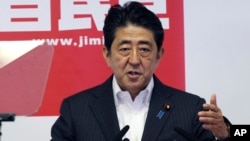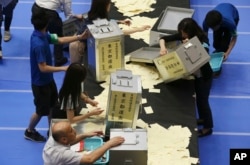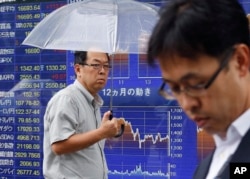Jpanese Prime Minister Shinzo Abe said on Monday that winning a landslide election victory will not guarantee the approval of his controversial proposal to revise the country’s pacifist constitution.
"To realize a revision of the constitution is my duty as LDP [Liberal Democratic Party] president. It is not an easy task as revisions require a two-thirds majority in both houses of parliament, but I hope the debate will deepen steadily from now." said Abe at news conference on Monday.
The ruling coalition won 70 of 121 seats up for election this year despite a weak economy and strong public opposition to Abe’s controversial position on changing the constitution to increase the power and scope of the military.
Only half the seats in the 242-member upper house of the bicameral legislature, known as the National Diet, are up for election every three years. Abe’s Liberal Democrats gained 56 seats and the allied Komeito party won 14 seats.
The ruling coalition already controls the more powerful lower house but needed Sunday’s upper house victory to gain the two-thirds majority in both houses that is required, along with a simple majority in a nationwide referendum, to change the constitution.
The prime minister said ultimately the Japanese public will decide on the question of revising the constitution during the national referendum phase.
Article 9
Despite Abe’s victory, the Japanese public remains divided over his proposal to modify article 9 of the constitution put in place after WW II, that prohibits Japan from going to war to settle international disputes involving the state.
Last year, mass protests that erupted across the country failed to dissuade Abe’s supporters in the Diet from passing controversial security legislation that revised 10 existing laws to give the military more latitude to defend its people and interests and to participate in collective self-defense and defend allies like the United States.
Abe’s supporters say that Japan needs a stronger and less restricted military to counter potential threats from countries like China and North Korea that are increasing their military and nuclear capabilities.
Opponents argue that renouncing Article 9’s constitutional constraint on the use of force will entangle Japan in international conflicts, most likely in support of its U.S. military alliance.
Opinion polls indicated that a majority of Japanese has strong reservations about a more assertive role for the military.
More about economy
The main opposition Democratic Party, together with the Japanese Communist Party, made protecting the pacifist constitution a key issue in the campaign, but Abe and his supporters focused on his Abenomics program, which is intended to boost growth by increasing spending and reducing the value of the Yen to increase exports.
Even though the results have so far been mixed - improving corporate profits and share prices while wages and spending have remained flat – analysts say the opposition parties offered no viable alternatives.
Abe said on Monday that he will increase domestic spending to stimulate growth given the slowing global economy and rising protectionist sentiment in the United State and Europe.
“I'll instruct economy minister Ishihara tomorrow to compile an economic stimulus package," he said.
Abe did not indicate the size of the stimulus but there is speculation that that it could be as high as $100 billion
Tokyo’s stock market seemed to react favorably on Monday to Japan's ruling coalition victory.
The Nikkei 225 surged 3.98 percent,while the broader Topix index of all first-section shares climbed 3.79 percent.
International concern
China and other countries in Asia that suffered under Japanese occupation during World War II have raised concerns that Tokyo could again become an aggressive military power if it continues to loosen its constitutional constraints.
China's official news agency Xinhua said in a commentary on Monday that “with Japan's pacifist constitution at serious stake and Abe's power expanding, it is alarming both for Japan's Asian neighbors, as well as for Japan itself, as Japan's militarization will serve to benefit neither side.”
Youmi Kim in Seoul contributed to this report.













